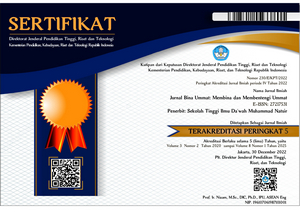EXPLORING THE FUNCTIONS OF JOURNALISM FOR ISLAMIC RELIGIOUS TEACHING
DOI:
https://doi.org/10.38214/jurnaldawahstidnatsir.v6i2.206Keywords:
Journalism, Islamic religious teaching, Da’wahAbstract
Over the last twenty years, much research investigations have investigated connections of Islamic values as well as various journalism facets. Previous study often highlighted the accepted functions in Islamic religious teaching, as well as the overall qualities of journalism. Moreover, religious organizations and society often are expecting incorporation of journalism in their religious teaching publications. Consequently, journalism often attempts to fulfill what the public expects by prioritizing information as beneficial influence on humankind. Consequently, this study explored the functions of journalism in disseminating Islamic religious teaching beliefs influenced by the local community and religious organizations. In order to accomplish this objective, a systematic literature review was employed. The findings indicate that journalism's religious teaching publications, influenced by religious organizations and local community, adhere to four key principles: truthfulness and reliability, educational approach, prioritizing the public interest, and maintaining a balanced perspective. Muslim countries identify and highlight the many manifestations of these responsibilities. The findings indicate that an interventionist approach to media, which prioritizes the public interest and moderation principles, is very significant in the majority of cultures. In Muslim-majority countries, journalism's functions are mostly influenced by the political, economic, and socio-cultural circumstances rather than a specifically Islamic perspective.
Published
How to Cite
Issue
Section
Copyright (c) 2023 Jurnal Da'wah: Risalah Merintis, Da'wah Melanjutkan

This work is licensed under a Creative Commons Attribution 4.0 International License.
This work is licensed under a Lisensi Creative Commons Atribusi 4.0 Internasional.
Authors who publish with this journal agree to the following terms:
- Authors retain copyright and grant the journal right of first publication with the work simultaneously licensed under a Creative Commons Attribution License that allows others to share the work with an acknowledgment of the work's authorship and initial publication in this journal.
- Authors are able to enter into separate, additional contractual arrangements for the non-exclusive distribution of the journal's published version of the work (e.g., post it to an institutional repository or publish it in a book), with an acknowledgment of its initial publication in this journal.
- Authors are permitted and encouraged to post their work online (e.g., in institutional repositories or on their website) prior to and during the submission process, as it can lead to productive exchanges, as well as earlier and greater citation of published work (See The Effect of Open Access).




